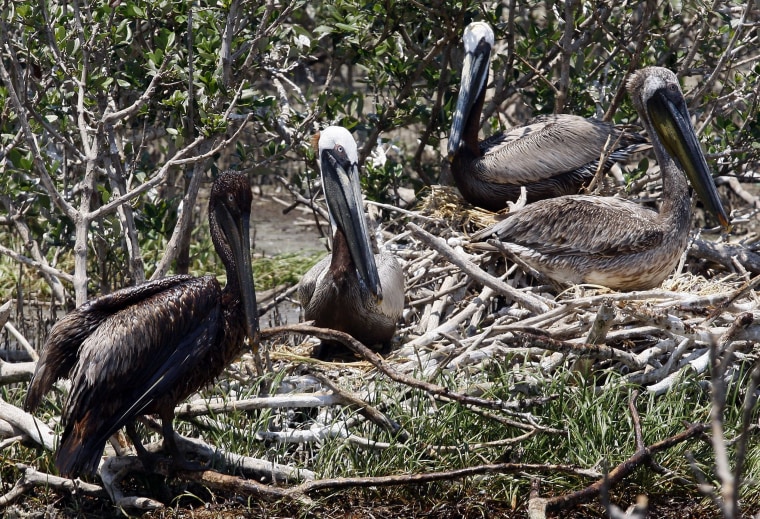In its harshest criticism of BP to date, the Obama administration on Sunday said the oil giant had missed "deadline after deadline" in its efforts to seal the blownout oil well in the Gulf of Mexico.
At a press conference outside BP America's Houston headquarters, Interior Secretary Ken Salazar said he understood the challenges but was frustrated that BP had set deadlines that "have not been met."
Asked if he trusted BP, Salazar said that the company "from day one, frankly, has not fulfilled the mission it was supposed to fulfill."
"There's no question BP is throwing everything at this problem," he said, but then added: "Do I have confidence that they know exactly what they're doing? No, not completely."
He said that's why NASA, the Department of Energy and other agencies have stepped in to work with BP engineers on solutions. Salazar and officials from those agencies met with BP staff earlier Sunday.
By law, BP as the responsible party has to carry out the cleanup, while the government provides oversight.
After the Exxon Valdez tanker spilled 11 million gallons of oil in Alaska in 1989, Congress dictated that oil companies be responsible for dealing with major accidents — including paying for all cleanup — with oversight by federal agencies.
"If we find they're not doing what they're supposed to be doing, we'll push them out of the way appropriately," Salazar said.
Why not push BP aside?
But the Coast Guard official in charge of the oil spill response operation tempered that view.
The government is forced to rely on BP and the private sector because only they have the technical know-how to stop the spill at those depths, Coast Guard Commandant Thad Allen said Sunday.
Allen was asked on CNN's "State of the Union" show why the federal government did not completely take over the spill containment operation.
"What makes this an unprecedented anomalous event is access to the discharge site is controlled by the technology that was used for the drilling, which is owned by the private sector," Allen said. "They have the eyes and ears that are down there. They are necessarily the modality by which this is going to get solved."
Anger with the government and BP, which was having a well drilled when the blowout happened, has boiled over as the spill spreads.
Environmental Protection Agency chief Lisa Jackson was back in Louisiana, where she planned to visit with frustrated residents.
Salazar and Secretary of Homeland Security Janet Napolitano were to lead a Senate delegation to the region on Monday to fly over affected areas and keep an eye on the response.
White House Press Secretary Robert Gibbs also told CBS' "Face the Nation" on Sunday that Justice Department officials have been to the region gathering information about the spill. However, he wouldn't say whether the department has opened a criminal investigation.
President Barack Obama also has named a special independent commission to review what happened.
The spill began after the Deepwater Horizon oil rig exploded off the coast of Louisiana on April 20, killing 11 workers, and sank two days later. At least 6 million gallons of crude have spewed into the Gulf of Mexico since, though a growing number of scientists have said they believe it's more.
'Top kill' next attempt
The visits from top Obama chiefs come as BP said it will be at least Tuesday before engineers can shoot mud into the blownout well at the bottom of the Gulf, yet another delay in the effort to stop the oil.
A so-called "top kill" has been tried on land but never 5,000 feet underwater, so scientists and engineers have spent the past week preparing and taking measurements to make sure it will stop the oil that has been spewing into the sea for a month. They originally hoped to try it as early as this weekend.
"It's taking time to get everything set up," BP spokesman Tom Mueller said. "They're taking their time. It's never been done before. We've got to make sure everything is right."
Crews will shoot heavy mud into a crippled piece of equipment atop the well. Then engineers will direct cement at the well to permanently stop the oil.
BP has tried and failed several times to halt the gusher, and has had some success with a mile-long tube now siphoning some of the crude and natural gas.
Engineers are also developing several other plans in case the top kill doesn't work, including an effort to shoot knotted rope, pieces of tire and other material — known as a junk shot — to plug the blowout preventer, which was meant to shut off the oil in case of an accident but did not work.
In other developments:
- BP spokesman John Curry said Sunday the mile-long tube inserted into the leaking well siphoned some 57,120 gallons of oil within the past 24 hours, a sharp drop from the 92,400 gallons of oil a day that the device was sucking up on Friday. However, the company has said the amount of oil siphoned will vary widely from day to day.
- A pelican colony in Barataria Bay off Louisiana was awash in oil. Several of the birds splashed in the water and preened themselves, apparently trying to clean crude from their feet and wings. Pelican eggs were glazed with rust-colored gunk, with thick globs floating on top of the water. Nests sat precariously close the mess in mangrove trees. Workers had surrounded the island with the booms, but puddles of oil had seeped through the barrier.
- A marine scientist said that to figure out how much oil has spilled, experts should measure the plumes of dissolved methane coming from the blown well. Unlike oil, methane dissolves uniformly in seawater so it could be measured accurately and scientists could use that measurement to calculate the amount of the spill, David Valentine of the University of California-Santa Barbara wrote in an opinion article in the journal Nature.
